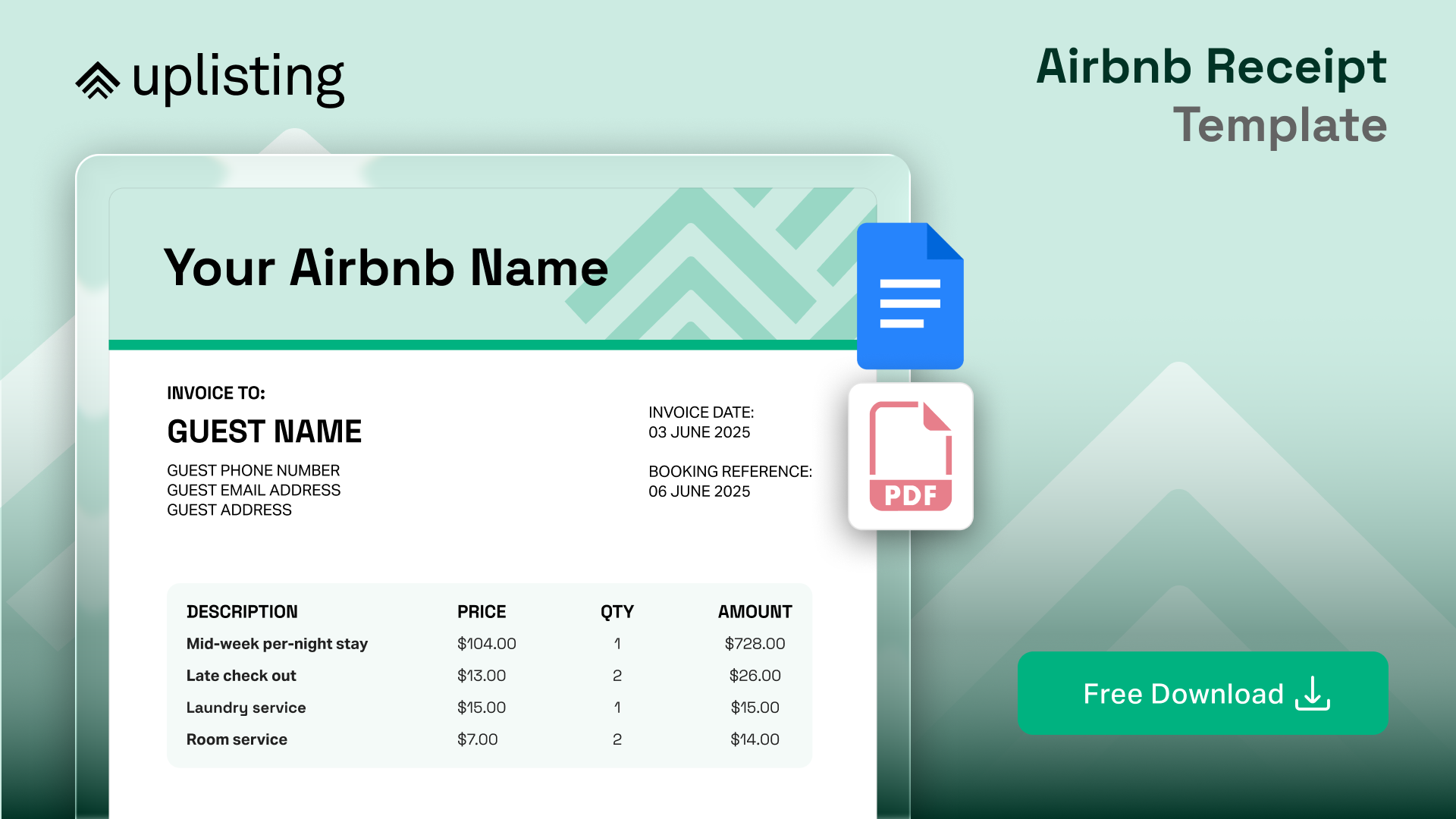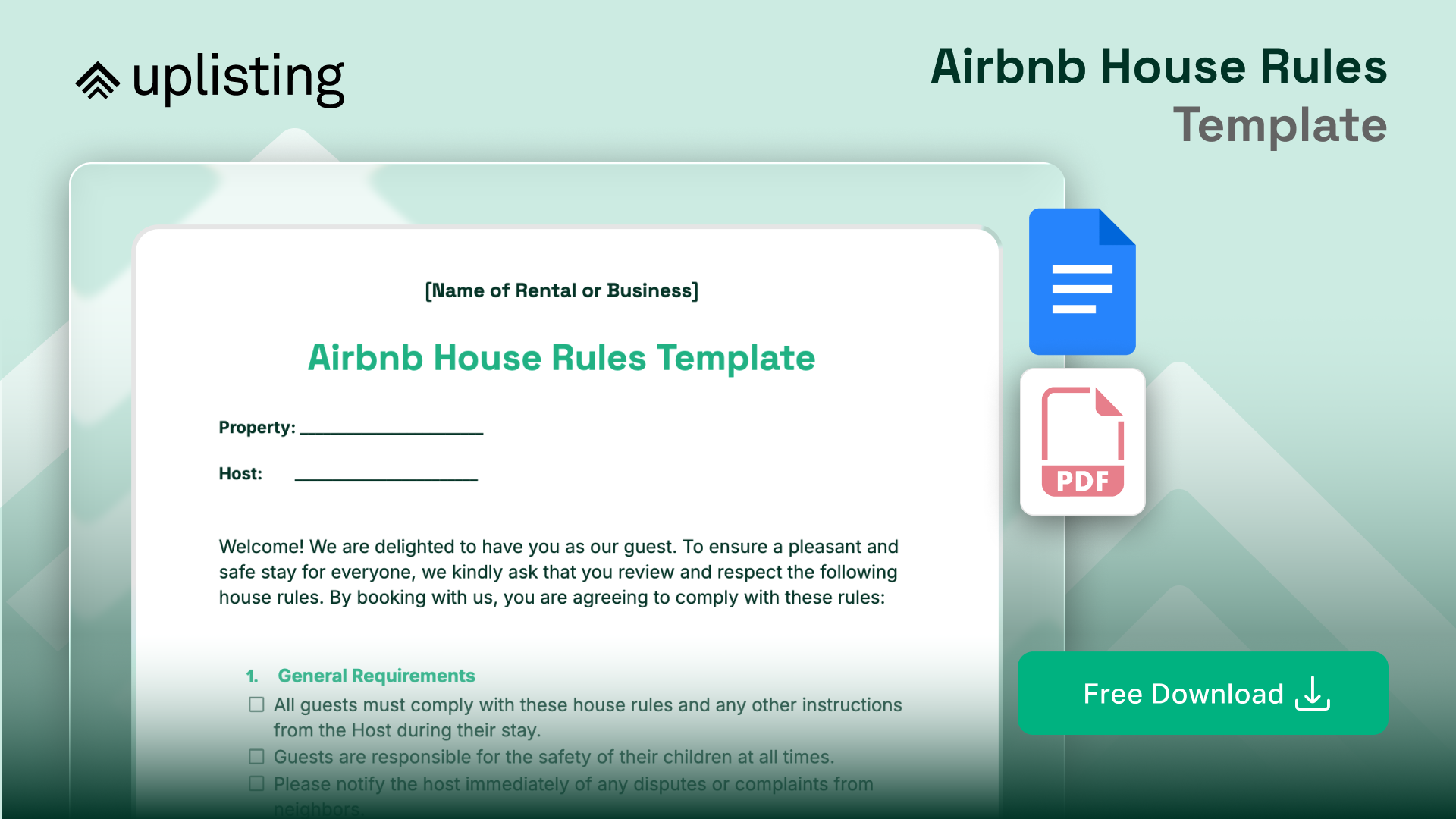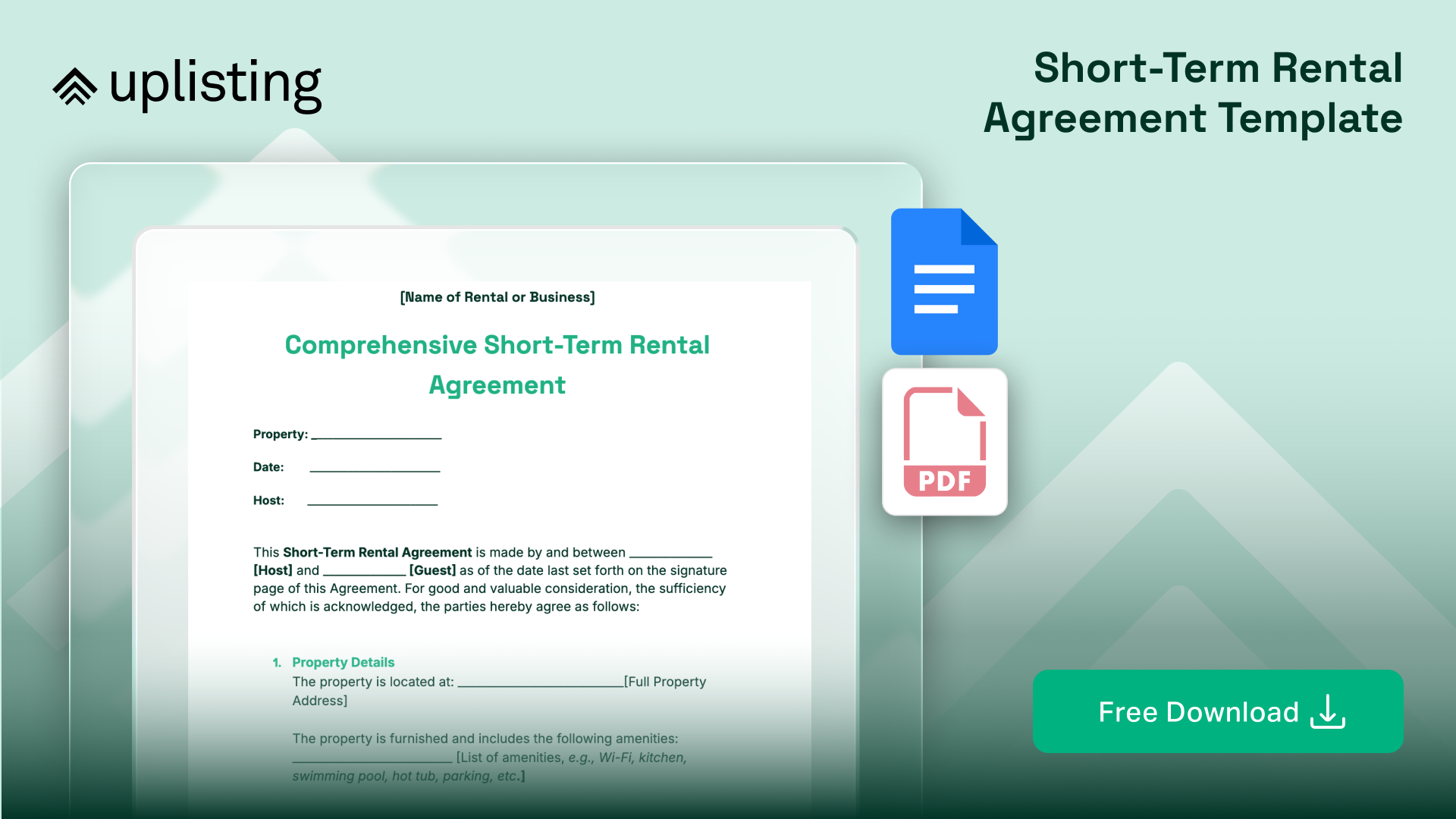Key Takeaways
All Airbnb income must be reported, even for occasional hosts.
Hosts may receive a 1099-K form if they pass reporting thresholds, but other forms and international tax obligations are the host's responsibility.
Deductible expenses like cleaning, supplies and maintenance can lower your tax bill, but only if you keep accurate records come tax season.
Tax season catches many short-term rental hosts off guard, especially first-timers who assume Airbnb payouts are already handled.
But the reality is simple: your vacation rental income is taxable, and the IRS expects a full report. Whether you rent out your home a few weekends a year or run five listings full-time, that income counts.
This guide breaks down what you need to know about Airbnb income tax. We’ll explain how income gets reported, which forms you’ll receive and what expenses you can deduct to lower your tax bill.
Understanding your tax responsibilities isn’t just good compliance, it’s good business, so let’s get into it.
Let's Start With Airbnb Income Tax Basics
Every guest payment, nightly rates, cleaning fees, pet surcharges, or extra guest charges, counts as rental income.
If money lands in your account, the IRS sees it as taxable. It doesn't matter if the payment comes through a booking platform or gets sent through a cash app. If you earn it, you need to report it.
Some hosts assume smaller earnings don't trigger any tax obligations. Not true. The IRS doesn’t set a minimum income threshold for reporting Airbnb rental income. Whether your property brings in $200 or $20,000, you still need to include the full amount when filing. If your payouts exceed $20,000 and you’ve had more than 200 transactions, expect a 1099-K form. But even without that form, the tax responsibility still stands.
Federal taxes aren’t the only thing to worry about. Many states and cities also require hosts to collect and pay local lodging or occupancy taxes. Some platforms handle part of this automatically, but not always. You’ll need to confirm what’s being collected on your behalf and what still needs to be filed manually. Local tax issues can get expensive fast, especially when unpaid fees start piling up with penalties.
Treat every listing like a business, because tax agencies already do.
All-in-one Vacation Rental Software and Channel Management System
Get started in seconds by connecting Airbnb
Manage short-term rentals & bookings, message guests, take payment, and so much more. All in one easy-to-use platform (that never double-books).
How Airbnb Income Is Reported
Once guest payments start rolling in, the IRS expects you to keep track. Clear reporting keeps you compliant and avoids messy surprises when it’s time to file.
When you’ll receive a 1099-K
Some vacation rental platforms send a 1099-K if your gross earnings go over $20,000 and you’ve had more than 200 separate transactions. That’s the current threshold.
Starting soon, though, the bar drops to just $600, no matter how many bookings you had, so expect the form to show up even if you're running a single listing part-time.
The form includes the total amount guests paid before fees, refunds, or adjustments. It doesn’t break down cleaning fees or extra charges, and it doesn’t reflect payouts. You’ll need to compare the gross number on the form with your actual income to avoid reporting too much and to back up any deductions.
How to access your Airbnb earnings report
In tax season, you'll need the full figures. The good news, rental platforms make it easy to see how much you've made throughout the year.
Head to your host dashboard to download your earnings report. You can filter it by date range and export the full list of transactions. It covers payouts, refunds, taxes, and any adjustments.
Use the report to double-check the 1099-K total and get a clear number for what you actually earned. That includes separating out non-taxable items like deposits or reimbursements. Running the numbers monthly or quarterly makes it easier to catch errors early and stay on top of your Airbnb income tax obligations year-round.
What Income Needs to Be Reported
Airbnb payouts don’t always reflect the full amount you’re expected to report. The IRS looks at what guests pay, not just what shows up in your bank account. That means income often includes more than people expect.
Types of Airbnb income
Any money a guest pays for a stay is considered rental income. That includes nightly rates, cleaning charges, pet fees, extra guest add-ons, early check-in costs, and late checkout extensions. Even if you use a cleaning fee to pay your cleaner directly, the IRS still counts it as income. Same goes for extras like stocked pantries, wine packages, or local experience add-ons. If it’s charged through your listing, it gets reported.
Refundable security deposits are treated differently. If you return the full amount, you don’t report it. But if you keep part of it (say, to replace a broken lamp or stained bedding) you need to include that portion in your income total, although the expense covered is deductible.
Clear records help here. If you’re charging extra for anything, make sure it’s documented and easy to separate.
Adjustments for refunds and cancellations
Gross income is just the starting line. If a guest cancels or shortens their stay, you only report what you actually keep. That means subtracting any refunded amounts before reporting your income.
To stay accurate, track every cancellation or refund. If you give a guest $200 back after a last-minute change, your reported income should reflect the adjusted total, not the original invoice. Platforms don’t always break this down cleanly, so your own records matter. Keeping a running total each month makes tax time faster and avoids inflated income reports that could raise flags later.

Enjoy the confidence & focus you need to scale your vacation rental business
Book more while doing less
With a reliable VRM solution you can trust, Uplisting can help you grow your business without wasting time on double bookings, unhappy guests, upset clients and worrying what could go wrong next.
Tips for Staying Prepared for Tax Season
Tax season doesn’t need to feel like a mess of receipts, guesswork, and last-minute stress. A handful of smart habits throughout the year can make Airbnb income tax filing simpler and far less painful.
Track income and expenses monthly
Waiting until January to sort out earnings and costs usually leads to errors, missed deductions, and hours you don’t have. Instead, set a recurring time each month to review payouts, log supply purchases, and track maintenance expenses.
Even a simple spreadsheet does the job. Monthly tracking gives you cleaner records, fewer surprises, and a clearer picture of how each listing performs over time. It also helps spot patterns (like when occupancy dips or when utility bills spike) so you can make better decisions without scrambling later.
Keep records for several years
The IRS can revisit past filings up to three years back, longer if they suspect underreporting. Receipts, invoices, payment confirmations, mileage logs, and repair records all help support the numbers on your return.
Store digital files in folders labeled by year and category. Scan paper receipts and back them up in cloud storage. For anything involving depreciation or long-term capital improvements, hold onto the documents well past three years. Organized records don’t just keep you audit-ready, they also make prep faster when it’s time to calculate deductions or confirm a past write-off.
Separate business and personal accounts
Using one account for both personal and short-term rental transactions is a common mistake for new businesses, but it makes everything harder. It muddies the water, slows down bookkeeping, and increases the odds of missing deductible expenses or misreporting income.
Open a separate checking account just for hosting income and rental-related spending. Route guest payouts, supply purchases, and service fees through that account only. With clean transaction history, it's easier to generate reports, tag expenses, and pull accurate numbers during tax prep. For hosts managing multiple listings or planning to scale, splitting finances early saves time and avoids confusion later.
When to Get Help from a Professional
Filing Airbnb income tax usually isn’t too complicated, especially if you manage one property in a single location and your expenses are pretty straightforward. But once your setup starts stretching across state lines or you’re juggling multiple listings, it’s time to call in someone who knows short-term rental taxes inside and out.
Multi-property or multi-state hosting
Managing listings across different states means dealing with a mix of tax rates, local lodging rules, and separate filing deadlines. One state might ask for quarterly estimated taxes, while another doesn’t. Renting in a state where you don’t live can also trigger unexpected tax requirements. A tax pro can walk through each location’s rules and help you avoid late fees or missing returns.
Even in one state, multiple listings can complicate how you track income and expenses. If you’re depreciating appliances differently at each property, or splitting service fees across units, you’ll want someone who can organize that clearly on your tax return.
Complex deductions and shared-use properties
When you rent out part of your home, like a basement apartment, and live in the rest, you need to separate personal and rental expenses. That includes things like mortgage interest, utilities, and internet. Guessing won’t cut it. The IRS wants a consistent method and records to back it up. Same goes for claiming a home office used to manage your rental business. If that space also doubles as your personal workspace, the tax rules get tricky.
Bigger write-offs like depreciation or capital improvements also get harder to manage over time. A tax advisor who works with short-term rental hosts can help you make the most of those deductions without triggering an audit.
When peace of mind becomes the priority
Sometimes the biggest value isn’t about complexity... it’s about saving time.
If you’re running guest check-ins, managing your cleaner’s schedule, and keeping bookings steady, the last thing you need is to spend hours sorting through receipts in a panic. A tax professional handles the math, files the forms, and checks for missed deductions that could cost you later.
Already received a letter from the IRS? Missed something on last year’s return? Don’t try to fix it on your own. Airbnb income tax issues stack up fast across multiple years. Getting help early keeps it from turning into a bigger problem.
Create 5-star guest experiences
Give your guests unforgettable experiences
With Uplisting, you can send the right messages at the right time on all booking sites. Read and respond to guest messages in a single, unified inbox — whether you’re at the office or on the go.
Make Tracking Airbnb Income Tax Easy with a Property Management System
Tax season surprises many first-time Airbnb hosts. But whether you manage a single rental or operate a growing portfolio, short-term rental income is taxable and proper reporting is part of running a legitimate business. Staying informed about what counts as income, which deductions are allowed, and how to keep clean records puts you in control rather than reacting under pressure.
Airbnb income tax doesn’t have to be overwhelming. With consistent monthly tracking, clear separation of business and personal expenses, and support from professionals when needed, you’ll be ahead of the curve. Treat your short-term rental like the business it is, and taxes become another manageable part of your operation, not a source of stress.
The first step to getting your house in order is to get the right systems to support you. That's where a property management system comes in. Uplisting helps hosts automate their workflows, streamline their vacation rental management, and keep on top of those reciepts and income streams. Sign up for Uplisting today.
FAQs about Airbnb Income Tax
Will I pay taxes if I only rent my space for a few days?
If you rent your property for 14 days or fewer during the year and use it personally for more than 14 days, you don’t need to report the income or pay tax on it.
That’s the IRS’s “14-day rule”, and it’s one of the few exceptions that actually works in your favor. But the moment you cross the 14-day line (even by one night!) you’re in taxable territory.
For partial-year rentals, you still report income and prorate shared costs like utilities, mortgage interest, or insurance based on how many days the property was available to guests versus personal use. Keep those records clear from day one.
What if I receive a 1099-K from Airbnb?
When you get a 1099-K, the IRS gets the same form and they expect your return to match it, or explain why it doesn’t.
The form shows gross earnings, including guest payments, cleaning fees, and possibly canceled bookings that were refunded. That number rarely lines up perfectly with what you actually keep.
To report income accurately, compare the 1099-K total with your transaction history. Use Schedule E if you’re simply renting out space. Use Schedule C if you offer hotel-like services (like daily cleaning or meals) which shifts your setup into small business territory. Any mismatch between what the IRS sees and what you report needs clear, documented support.
Do non-US hosts owe US taxes on rental income?
Yes, if the property sits in the United States, the IRS wants a piece of the income, regardless of where the owner lives. Non-US hosts typically face a 30% withholding on gross rental income unless they file the right paperwork to reduce it.
Some tax treaties between the United States and other countries offer reduced withholding rates or exemptions, but you need to file forms like W-8ECI or W-8BEN to use them. Without those forms in place, the full 30% gets withheld automatically, even if you didn’t earn much. Filing properly upfront saves time and avoids overpaying.
Should I file estimated taxes?
If you expect to owe more than $1,000 in Airbnb income tax after subtracting credits and any previous payments, the IRS expects quarterly tax payments. Most part-time hosts fall under the radar, but anyone with steady bookings or multiple listings should plan ahead.
Missing estimated payments often triggers penalties, even if you pay everything by April. The IRS doesn’t wait for the end of the year, they want their cut as you earn. Running rough numbers each quarter helps you stay in the clear and avoid unexpected fees later.


















.png)

